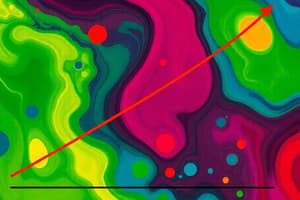Podcast
Questions and Answers
What describes the 'intrinsic rate of increase' in a population?
What describes the 'intrinsic rate of increase' in a population?
- It indicates a decrease in the population over time.
- It is primarily determined by environmental factors.
- It occurs under ideal conditions of unlimited resources. (correct)
- It represents a linear increase in population size.
What shape does the population growth curve take under fixed conditions in a lab experiment?
What shape does the population growth curve take under fixed conditions in a lab experiment?
- An 'S' shape (correct)
- An inverted U-shape
- A circular pattern
- A straight line
Which organism is mentioned as having a simple logistic curve due to its reproductive method?
Which organism is mentioned as having a simple logistic curve due to its reproductive method?
- Daphnia magna
- Drosophila
- Yeast
- Paramecium (correct)
What is the primary limit on the population of Drosophila in a lab setting?
What is the primary limit on the population of Drosophila in a lab setting?
What phenomenon occurs when a population temporarily exceeds its carrying capacity?
What phenomenon occurs when a population temporarily exceeds its carrying capacity?
Which factor can cause the young of a species to experience higher mortality rates despite initially having sufficient food?
Which factor can cause the young of a species to experience higher mortality rates despite initially having sufficient food?
Which statement accurately characterizes the carrying capacity?
Which statement accurately characterizes the carrying capacity?
During which process do yeast cells produce ethanol that can be harmful to them?
During which process do yeast cells produce ethanol that can be harmful to them?
What is the term for the maximum number of individuals of a population that may be supported by environmental conditions?
What is the term for the maximum number of individuals of a population that may be supported by environmental conditions?
What role do limiting factors play in an ecosystem?
What role do limiting factors play in an ecosystem?
What happens when reindeer populations are introduced without predators?
What happens when reindeer populations are introduced without predators?
Which factor does not typically control wild populations according to the information?
Which factor does not typically control wild populations according to the information?
In what scenario is mass starvation observed in wild populations?
In what scenario is mass starvation observed in wild populations?
Which statement accurately describes the logistic curve in wild populations?
Which statement accurately describes the logistic curve in wild populations?
What primarily affects the cormorant populations on different islands?
What primarily affects the cormorant populations on different islands?
What common occurrence happens to bird populations in various temperate regions during cold winters?
What common occurrence happens to bird populations in various temperate regions during cold winters?
In which situation would populations of ibex not stabilize even after hunting is banned?
In which situation would populations of ibex not stabilize even after hunting is banned?
What is a potential result of a population explosion followed by mass starvation?
What is a potential result of a population explosion followed by mass starvation?
Flashcards
Carrying Capacity
Carrying Capacity
The maximum population size that an environment can sustainably support, given its limited resources.
Logistic Growth
Logistic Growth
A growth pattern where a population initially increases rapidly but then slows down as it approaches the carrying capacity, eventually stabilizing at a certain level.
Geometric Increase
Geometric Increase
A growth pattern where a population increases exponentially, doubling in size at regular intervals, assuming ideal conditions with unlimited resources.
Intrinsic Rate of Increase
Intrinsic Rate of Increase
Signup and view all the flashcards
Overshoot
Overshoot
Signup and view all the flashcards
Organism with no larval or young stage
Organism with no larval or young stage
Signup and view all the flashcards
Organism with larval or young stage
Organism with larval or young stage
Signup and view all the flashcards
Yeast growth in lab experiments
Yeast growth in lab experiments
Signup and view all the flashcards
Limiting Factor
Limiting Factor
Signup and view all the flashcards
Logistic Curve
Logistic Curve
Signup and view all the flashcards
Population Crash
Population Crash
Signup and view all the flashcards
Factors other than Starvation
Factors other than Starvation
Signup and view all the flashcards
Population Fluctuation
Population Fluctuation
Signup and view all the flashcards
Lack of Nesting Sites
Lack of Nesting Sites
Signup and view all the flashcards
Rainfall and Nesting Sites
Rainfall and Nesting Sites
Signup and view all the flashcards
Multiple Factors on Population Abundance
Multiple Factors on Population Abundance
Signup and view all the flashcards
Variable Carrying Capacity
Variable Carrying Capacity
Signup and view all the flashcards
Study Notes
Population Growth 2
- Population growth under ideal conditions (unlimited space and food) increases geometrically.
- Real-world conditions are not ideal, limiting factors affect growth.
- In a laboratory setting, environments are often fixed, leading to logistic growth ("S" curve).
- The carrying capacity is the maximum population size that a given environment can support.
- The logistic growth model demonstrates that populations level off when resources become limited.
- Geometric growth is represented by the equation Nt = N0λt, where Nt is the population size at time t, N0 is the initial population size, and λ is the per capita rate of increase.
- Exponential growth is represented by the equation Nt = N0ert, where Nt is the population size at time t, N0 is the initial population size, r is the per capita rate of increase, and t is time.
- Logistic growth can be modeled by the equation dN/dt = rN(1 – N/K), where N is the population size, r is the per capita rate of increase, and K is the carrying capacity.
Logistic Curves in Lab Experiments
- The Drosophila (fruit fly) population is limited by the yeast it consumes, as yeast reproduce at a consistent rate.
- Yeast populations also follow a logistic curve.
- High ethanol concentrations are toxic to young yeast, allowing only older yeast to survive.
- Simple logistic growth models assume unchanging environmental conditions and no stage structures (like larvae).
Overshoot
- Populations may temporarily exceed carrying capacity (overshoot), especially in organisms with distinct life stages.
- This overshoot occurs when young organisms use a different food source compared to adults and the adults cause a food scarcity and die-off.
Wild Populations
- Stable carrying capacity doesn't often occur in nature.
- Instead, populations often fluctuate due to factors beyond starvation.
- Predation, parasitism, and disease are crucial factors influencing wild population sizes.
- Examples of reindeer on islands and Daphnia in a Canadian lake illustrate population crashes and recoveries rather than stable carrying capacity.
Climate
- Extreme climate events can greatly impact populations, such as cold winters for birds and Ibex in Switzerland.
- These populations do not always have a stable carrying capacity.
- Irregular population sizes may be due to the weather or climate and its impact.
Lack of Nesting Sites
- Some populations have limited carrying capacities due to insufficient nesting sites, impacting their growth and abundance.
- Cormorants on the Great Lakes, for example, are affected by the amount of nesting sites
Rainfall
- Water availability affects carrying capacity in different ways across various locations.
Studying That Suits You
Use AI to generate personalized quizzes and flashcards to suit your learning preferences.





